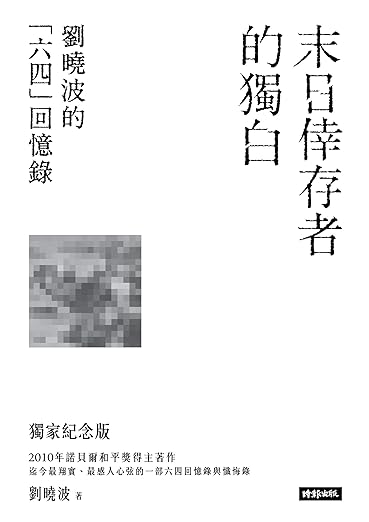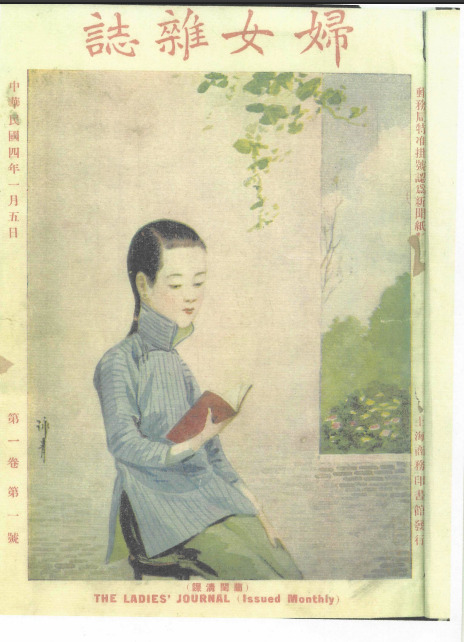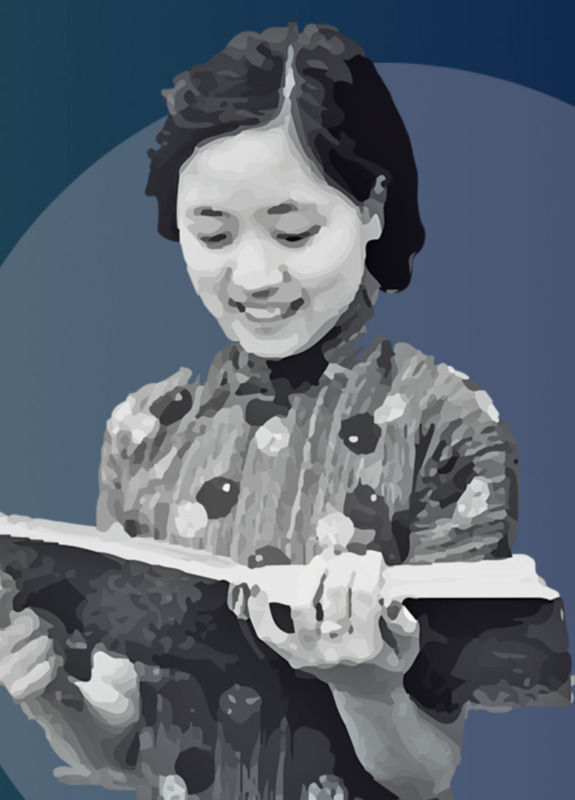Explore the collection
Showing 6 items in the collection
6 items
Book
Great Power Sinking: A Memo to China, A
This book is a collection of political essays by Nobel Peace Prize winner Liu Xiaobo. It is a sister volume to *Single-Edged Poisoned Sword - A Critique of Contemporary Nationalism in China*, which covers many aspects of Chinese politics, including: one-party dictatorship, powerful capitalism, rights defense, June Fourth, and nationalism.
Book
Monologue of a Doomsday Survivor: About Me and June 4
购书链接:https://www.kobo.com/hk/zh/ebook/ZoerWPfG8TiqoXIYwvW2iw。
Film and Video
Not the Foreign Force
During the three years of the "zero-COVID" policy enforced by Xi Jinping's government, the daily life and freedoms of the people were severely limited. A fire in Urumqi, Xinjiang, finally ignited public dissatisfaction with the measures. On November 26, 2022, when the people of Shanghai spontaneously gathered in the streets to mourn the victims of the fire, no one expected that this memorial activity would lead to nationwide protests against the pandemic policies. At the scene, Chen Pinlin and his girlfriend, Wang, filmed many protest videos at the protest site on Urumqi Middle Road in Shanghai.
In November 2023, on the anniversary of the White Paper Movement, Chen Pinlin uploaded the documentary to YouTube and other social media platforms, garnering hundreds of thousands of views. Less than a week later, he and his girlfriend were arrested. His girlfriend was released on bail, while Chen Pinlin remained in custody.
<a href=“https://tenchu.org/pocd/public/pocs/3551”>Chen Pinlin introduced the documentary as follows</a>: "I am the director Plato. In November 2022, I personally participated in the protest on the night of November 26 in Shanghai. This was my first involvement in a political event in China, and it was also the first time I expressed my political demands in China. Besides the footage I personally filmed on that day, the film also includes iconic video materials from before and after the protest. I tried to present a complete picture of how the dynamic zero-COVID policy pushed China to the boiling point and prompted people to take to the streets to protest. After the event, the Chinese government distorted the facts and maliciously smeared the protests in Shanghai and the White Paper movement, misleading many people into thinking that the protests were the work of foreign forces. But is this really the case? On the first anniversary of the Shanghai Urumqi Road protest, I created this documentary, “Urumqi Middle Road”, to record my personal experience and feelings of participating in the protest. I want to explore why, when internal contradictions appear in China, foreign forces are always blamed? Everyone knows the answer. The more the government misleads, forgets, and shields the truth, the more we must speak out, remind people, and remember. Remember the White Paper, remember November 26, remember Urumqi Middle Road, remember the Xinjiang fire, remember the Guizhou bus, remember dynamic zero-COVID, remember the 'big white' (the white-suited workers), remember Tiananmen, remember the Cultural Revolution, remember the Three Years of Great Famine. "By remembering the ugliness, we can turn our hearts toward the light. I also hope that China can soon embrace its own brighter future."
At the end of this movie, Chen left this narration: Some people say, what is the point of protesting on the streets? In the end, it's still the same, suppressed, shielded and misinterpreted. But as Churchill said, ‘Courage is the most important human trait, with courage, other human traits can naturally be possessed' We lacked experience and have been cowardly and wavering, but today we have the courage to stand up and to speak out. What we lacked this time, we can do better next time. If I were to do it again, I would still choose to be there. Because a government that is afraid of even a white paper can't defeat the justice in the hearts of the people.
On January 5, 2024, Chen Pinlin was formally arrested on suspicion of "picking quarrels and provoking trouble" and detained at Baoshan District Detention Center in Shanghai. On January 6, 2025, Chen Pinlin’s first trial was held in the Third Court of Baoshan District Court, where he was sentenced to 3 years and 6 months in prison. His sentence will end on May 27, 2027.
Periodicals
The Ladies Journal
The Ladies Journal was founded in January 1915 by the Commercial Press Shanghai. It was a monthly magazine primarily targeting upper-class women. It ceased publication in 1932 when the Commercial Press was destroyed by Japanese bombing. The magazine was distributed in major cities in China and overseas, such as Singapore. The magazine was considered an influential forum for the dissemination of feminist discourse in modern China, given its long operation and large readership.
The magazine spanned important historical periods such as the May Fourth Movement and the National Revolutionary period, and readers can see how the political environment and social trends influenced the political stance and style of the publication.
Although it was a women's magazine, the chief editors and the authors of most of the articles were men. According to Wang Zheng, Professor Emeritus of Women's and Gender Studies and History at the University of Michigan, the early articles of The Ladies Journal were more conservative. Although it advocated for women’s education, the goal was to train women to be good wives and mothers. Later, under the influence of New Culture Movement and the May Fourth Student Movement, the magazine was forced to reform itself and began to publish debates on women's emancipation as well as to call for more women's contributions, spread liberal feminist ideas, and support women's movements across the country.
1923 saw the beginning of the National Revolutionary period, and the Chinese Communist Party’s nationalist-Marxist discourse on women’s emancipation started to challenge liberal feminism, and the magazine's influence waned. In September 1925, the magazine ceased to be a cutting edge feminist publication after it changed its chief editor again and shifted its focus to ideas more easily accepted by conservative-minded readers,such as women's artistic tastes.
Although the <i>The Ladies Journal</i> was run by men, and some articles displayed contempt for and discrimination against women, it pointed out and discussed many issues that hindered women's social progress, such as lack of education, employment, economic independence, marriage freedom, sexual freedom, family reform, emancipation of slave girls, abolition of the child bride system, abolition of prostitution, and contraceptive birth control. It was also open to many different ideas and views, all of which were published. It is a valuable historical source for the study of women's studies and modern Chinese history.
Yujiro Murata, a professor at the University of Tokyo, founded the The Ladies Journal Research Society in 2000, along with a number of other colleagues interested in women's history from Japan, Taiwan, China, and Korea. The two main goals of the Society are to produce a general catalog of all seventeen volumes of the Magazine and to bring together scholars from all over the world to conduct studies based on the magazine. With the assistance of the Institute of Modern History of Academia Sinica in Taiwan, the magazine was made into an online repository, which is stored on the Institute’s “Modern History Databases” website, and can be accessed by the public.
Link to the database: https://mhdb.mh.sinica.edu.tw/fnzz/index.php. Thanks to the Institute of Modern History, Academia Sinica, for authorizing the CUA to repost.
Database
Modern Women’s Biographies Database
The Modern Women’s Biographies Database is part of the Modern History Digital Database of the Institute of Modern History, Academia Sinica, Taiwan. The goal of the database is to create biographical information on women in modern China, in order to counter the dominance of biographies of male figures in modern China history. The database includes biographies of 1,848 women in modern China, a few of whom were not Chinese but were included because they taught at universities in China or Taiwan.
In addition to browsing and searching for biographies, the database provides two additional functions: 1. “Biography Connections”: users can select multiple biographies to generate a map displaying social connections among selected figures; 2. “Place of Origin Map”: a map presenting the places of origin and eras of the figures, and users can click the markers on the map to read the biographies of the figures. By visualizing the biographical information, users can have an overview of the organizational networks of modern women's groups, as well as the development of women's discourse.
Link to the database: https://mhdb.mh.sinica.edu.tw/women_bio/index.php. Thanks to the Institute of Modern History, Academia Sinica, for authorizing the CUA to repost.
Database
Modern Women Journals Database
This database is part of the “Modern History Databases,” operated by the Institute of Modern History of Academia Sinica in Taiwan. The "Women and Gender History Research Group" of the Institute endeavors to collect, digitize and categorize related books and journals from libraries worldwide, and established the Modern Women Journals Database, which consists of 214 journals and 110,000 individual items. The database has been made available for public use since 2015.
In 1919 and the years that followed, women’s movement in China was on the rise, and as a result, many women's magazines appeared, a lot of which were run by women. Most of the journals collected in this repository were published between 1907-1949, with some published after 1949; there are comprehensive publications, as well as those focusing particularly on women's movements, family, health, employment, etc.; nearly a quarter of the publications were published in Shanghai, followed by Beijing, Guangzhou, and Nanjing. As can be seen from the Database, most of these journals have a relatively short duration, ranging from one to five years. Through this database, readers can gain a more comprehensive understanding of the history of women and women’s movements in modern China.
In addition to browsing journals and searching the database, users can also conduct author research and journal analysis. Under the author research section, users can read author biographies, as well as see the number of articles written by a particular author, and a map displaying their family and social relations. Under the journal research section, users can generate maps by keywords, eras, and article categories, which can provide more multi-dimensional information about a specific era or topic.
Link to the database:https://mhdb.mh.sinica.edu.tw/magazine/web/acwp_index.php. Thanks to the Institute of Modern History, Academia Sinica, for authorizing the CUA to repost.





